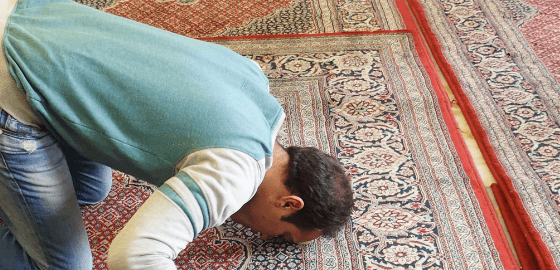Life is hard. There is no doubt about. God put us on this earth to test us. Sometimes we are tested with ease, to test our gratitude. Sometimes we are tested with temptation to show our resolve. And sometimes we are tested with difficulties to reveal our patience. Life goes through various ups and downs, most of the time being a combination of various tests.
Knowing this, we must thank our Creator for revealing Islam and guiding us to follow. Because it is only Islam that has so many built-in coping mechanisms that make the trials of life bearable. This doesn’t mean that every person can easily handle life by just following Islam. But following Islam definitely makes it easier to cope with the trials of life. Here are some of the ways Islam equips us to handle the ups and downs of life.
Belief in Qadr (Destiny)
Belief in Qadr (destiny) is one of the six primary beliefs in Islam. Every Muslim must believe that God knows everything and that nothing can happen without the will of God. While this belief may pose an ideological dilemma for philosophers who dwell too deep into the hows and whys, it provides comfort and relief to the minds of the average believer.
Knowing that everything that happens to us is part of God’s plan and will provides comfort to those who trust God and His Infinite Wisdom. The Quran is full of stories of people who went through difficult trials ending in great achievements, the story of Prophet Yusuf (Joseph) being the clearest example of this. Stories like this remind us that the trials of life are part of a bigger picture that we may only understand later in life, or maybe even only in the Afterlife.
Tawakul (Trusting God)
Linked to belief in Qadr is the internal act of worship called Tawakul (Trust). Tawakul means to entrust one’s affairs and result to Allah and to be content with His Will. Tawakul is often mistaken for Fatalism; a lazy reliance on God without any effort. This is not the Islamic understanding of Tawakul. Tawakul means to put in one’s best effort, then to be content with the result.
Tawakul helps Muslims cope with many of the ups-and-downs of life, especially regarding finances. When a Muslim experiences a slow period of sales or loses a source of income, Tawakul drives them to be optimistic and to seek out a new, perhaps better, opportunity. The believer is pushed forward by God’s promise, “Whoever puts his trust in God, He will suffice him. Indeed, God will accomplish his goals.” (Quran 65:3)
Sabr (Patience and Resiliency)
We have written many articles about Sabr in the past and included entire sections on it in some of our books. The Quran instructs believers to seek God’s assistance through Sabr and Salah. (Quran 2:153) Sabr is an active state of resiliency, persistence, restraint, and forbearance. It is necessary for accomplishing goals, overcoming temptations and dealing with setbacks of life.
The believer is always in a state of Sabr. He is either persisting in good deeds, restraining himself from sin, or bearing the challenges of life with patience. Sabr makes every stage of life more bearable, and has helped people get through some of the most traumatic events. Without the concept of Sabr, life would be very difficult to bear.
Salah (The Formal Prayer)
Linked with Sabr in multiple verses is Salah. God instructs us to seek His Assistance through Sabr and Salah. Salah connects the heart to the believer, allowing one to find comfort in the company of God, pouring one’s heart out to Him, and seek His assistance in every way. Salah is the ultimate act of submission that shows a person worships God alone, and asks God alone for assistance during difficult times.
Dua (Private Supplication)
Linked to Salah is dua. One of the ways we are supposed to seek assistance through Salah is by pouring our heart out to God in the prostration (Sajdah). Dua is the essence of worship and one of the most important things that a believer can do during times of difficulty. The narrations state that only dua can override destiny. (Ibn Majah 90) So when one’s destiny seems dark, the believer finds comfort in Salah and dua.
The Muslim Community (Ummah)
It is true that the Muslim community is often the source of our trials in life. Sometimes Muslims can be their own worst enemies. Pettiness, jealousy, extremism, and sectarianism all form part of the tests of life. But if so many of the trials of life come from society, why then do I list the concept of an ummah as a source of ease?
Because despite all of its faults, the Muslim community remains a source of blessings for its members. When a believer falls into major calamity, quickly you will find other members of the community rushing to crowdfund and assist them. This level of care for others across the globe is truly a blessing from God. Knowing that we are part of an ummah that has our back in the worst of times makes life more bearable, regardless of our faults as a community.
The Akhirah (Afterlife)
Belief in the Afterlife is also one of the six fundamental beliefs of Islam. Islam teaches us that this life is temporary and that eventually our souls will leave these bodies and return to God. We will then be judged for how we lived our lives, and either earn eternal damnation, eternal bliss, or temporary punishment followed by eternal bliss. So how does this belief make life bearable?
There are two ways that belief in the Afterlife makes life bearable. The first is by knowing that this life is temporary and that a life of eternal bliss potentially awaits us beyond. This brings comfort to the hearts of those whose trials last a lifetime. They know that eventually the trial will end and they will be rewarded eternally for their Sabr.
The second way is through the concept of God’s Perfect Justice. Life in this world can be unfair, and often tyrants get away with great evil. The believer find comfort in knowing that Justice will be served on the Last Day, and that nobody gets away with tyranny. For anyone who has been harmed in this world, and seen the perpetrator walk free, knowing that he will be brought to justice on the Last Day makes the test a bit more bearable.
Conclusion
These seven concepts all play a role in helping us cope with and overcome the challenges of life. It is true that they won’t work one hundred percent of the time for everybody. Some people require counseling, others require justice in this world to move on. There are many dynamics at play.
But there is great benefit in believing in Qadr and the Afterlife while practicing Tawakul, Sabr, Salah, and Dua while sticking the Muslim community. All of this makes life more bearable and helps the believer focus on what matters most; worshiping God and earning one’s place in the eternal garden.
For more beneficial articles like this, check out our latest publication; a compilation of our 30 best articles available here.






